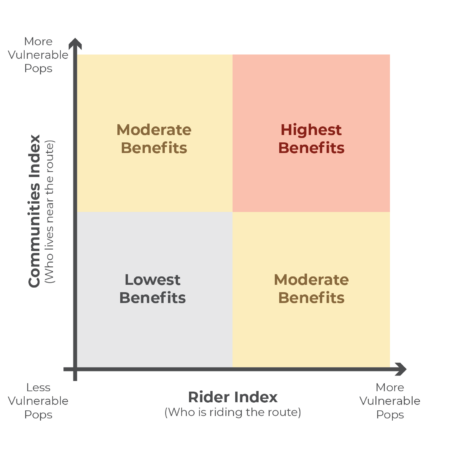This project outlined a transition plan for Washington Metropolitan Area Transit Authority (WMATA) to follow as they deploy zero-emission buses (ZEB) across their nine garages. Equity is an important consideration for any deployment of a new technology or major transportation investment and particularly for ZEB projects where both are at stake. Foursquare ITP worked with WMATA to ensure that traditionally underrepresented groups were actively considered and prioritized in the decision-making process so that the people who will benefit the most from ZEBs can start accruing those benefits sooner.
The Foursquare ITP team supported the data cleaning and analysis of route and block data to understand the feasibility of transitioning to battery electric bus service. This included processing current schedule GTFS data, block data and calculating slopes across every route in the Metrobus system. Additionally, Foursquare ITP supported an equity-focused task to help WMATA understand the risks and potential impacts of a ZEB transition to low income and minority populations.
Foursquare ITP also led the development of an equity-focused methodology that ranked garages and routes within a garage for electrification priority. Foursquare ITP also led WMATA operations staff in a workshop to discuss risks associated with a ZEB transition and mitigation strategies for each risk. The Equity Report, part of a series of technical reports informing the transition plan, assessed how Metro can best advance equity by prioritizing the transition of routes and garages that have the highest equity benefits and presents strategies that Metro may consider to mitigate potential operational and safety risks that may disproportionally impact equity riders.
Due to Foursquare ITP’s planning and implementation, WMATA was able to convert their entire fleet over quicker than initially expected. Mass Transit Magazine wrote two articles about this project.

Solutions and Outcomes
- Developed a rigorous analytical approach to prioritizing routes and garages for ZEB deployment with an eye for equity concerns.
- Developed a comprehensive summary of risks posed by the ZE transition and potential mitigations to those challenges, gathered through extensive in-reach workshops.
- Anticipated full fleet conversion three years faster than predicted.